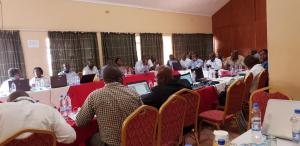Planning workshop for water quality monitoring for senior managers held
The workshop, was held from 9 to 11 January 2019 at Mazowe Hotel in Mashonaland Central province. The meeting was prompted by several factors including the fact that Zimbabwe does not have a water safety plan or a water quality monitoring plan and is facing an onslaught from cholera and typhoid outbreaks which are both associated with poor water quality and sanitation. Also, due to the prevailing economic hardships, many local authorities are facing challenges in providing adequate safe drinking water; and as a result, community members have resorted to indiscriminately sinking boreholes and shallow wells in residential areas. The monitoring of water quality from these private sources is of paramount importance.
The meeting brought together directors, deputies and other senior managers from the Environmental Health Directorate at Ministry of Health and Child Care, directors and assistant directors of health for urban local authorities, provincial environmental health officers, senior officers from the Zimbabwe Defence Forces department of epidemiology and disease control; and representatives from the National Coordination Unit and the National Institute of Health Research, and the technical facilitation was provided by MOHCC, UNICEF and WHO.
The meeting tackled issues including how local authorities are failing to fully exercise their mandate of providing safe water due to financial constraints, and the sprouting of unsanctioned boreholes in urban areas; the inadequate monitoring and regulating of private water vendors by local authorities, and little compliance with water quality monitoring requirements by all health institutions; non-payment by local authorities for water samples submitted to the government analyst laboratory; and the negative impact of the macroeconomic environment on health programs. The discussions generated many ideas and at the end of the workshop, participants developed a generic national water safety plan from which local authorities will develop their own specific water safety plans.
“The workshop was very important and came at a time when the country is grappling with water-borne diseases like cholera and typhoid. The workshop developed a generic national water safety plan from which local authorities will develop their own specific water safety plans. These water safety plans will contribute to the protection of public health by promoting improvements in the quality, accessibility, coverage, affordability and continuity of water supplies. A road map for water quality monitoring has emerged from the workshop, and the workshop has also managed to standardize water quality monitoring in Zimbabwe,” said Lt. Col. J Mupanda, Dept of Epidemiology and Disease Control, Zimbabwe Defence Forces who was one of the participants.

